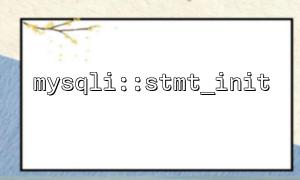In PHP development, the mysqli extension provides rich database interaction features, and the mysqli::stmt_init function is an important tool for initializing statement objects. It is typically used with prepared statements to enhance performance and prevent SQL injection. However, when using persistent connections, could there be any issues with the mysqli::stmt_init function? This article will examine its compatibility and the important considerations when using it.
In database interaction, a persistent connection is a connection method that keeps the connection open through the mysqli or PDO extension, allowing it to be reused for subsequent requests. This reduces the overhead of frequent connection and disconnection, improving application performance, especially in high-traffic environments. The common way to use persistent connections is through a special parameter in the mysqli_connect function or by enabling it in the mysqli configuration.
$mysqli = new mysqli('p:localhost', 'username', 'password', 'database');
In the code above, the p: prefix indicates a persistent connection.
mysqli::stmt_init is used to initialize a mysqli_stmt object so that it can be used for prepared statements in subsequent operations. This is one of the best practices to prevent SQL injection. A typical usage is as follows:
$mysqli = new mysqli('localhost', 'username', 'password', 'database');
$stmt = $mysqli->stmt_init();
<p>if ($stmt->prepare("SELECT * FROM users WHERE username = ?")) {<br>
$stmt->bind_param("s", $username);<br>
$stmt->execute();<br>
$stmt->close();<br>
}<br>
In the code above, we use stmt_init to initialize a statement object, which is then used to prepare the SQL statement, bind parameters, and execute the query.
Although persistent connections can improve performance, they may sometimes encounter compatibility issues with the mysqli::stmt_init function. Here are some common issues and their solutions:
Persistent connections are reused in subsequent requests, but some database states (such as cached queries or statements) may not be properly cleared in new requests, causing the statement object to fail to reinitialize. In such cases, mysqli::stmt_init may return false, resulting in a failed statement initialization.
Solution: Ensure that statement objects are properly closed and cleaned up before and after each request. If connection issues arise, try closing the connection and reopening a new one, or check the database server configuration to avoid problems caused by connections that remain open for long periods.
$mysqli = new mysqli('p:localhost', 'username', 'password', 'database');
$stmt = $mysqli->stmt_init();
<p>if ($stmt->prepare("SELECT * FROM users WHERE username = ?")) {<br>
$stmt->bind_param("s", $username);<br>
$stmt->execute();<br>
$stmt->close();<br>
} else {<br>
// Handle error<br>
echo "Statement initialization failed: " . $mysqli->error;<br>
}<br>
Some database servers may not fully support persistent connections, or they may fail to clean certain states when persistent connections are used. This can lead to unexpected errors when executing statements.
Solution: Check if the database server supports persistent connections or if there are any known issues related to persistent connections. If the database and PHP configuration are compatible, it may be helpful to use non-persistent connections during debugging to see if the issue persists.
In some cases, a database connection pool might cache previous statement or connection states, which could cause exceptions when using stmt_init, particularly in multi-threaded environments. Persistent connections may cause some prepared statements to fail to initialize correctly in subsequent requests, affecting the stability of the application.
Solution: If possible, avoid using persistent connections frequently in multi-threaded or high-concurrency environments, or consider manually managing the connection pool to ensure that each request uses a clean connection.
Test the p: Connection Before Use
When using persistent connections, it is best to perform a connection test beforehand to ensure the database server can properly handle long-lived connections.
Connection Closing and Reuse Strategy
Persistent connections are not automatically closed, so managing the closing and reuse strategy of connections in your application is crucial. It is recommended to explicitly close connections after use to avoid connection leaks or resource usage issues.
Ensure Proper Statement Initialization
When executing prepared statements, always check that the stmt_init return value is successful to ensure that initialization did not fail due to connection problems.















